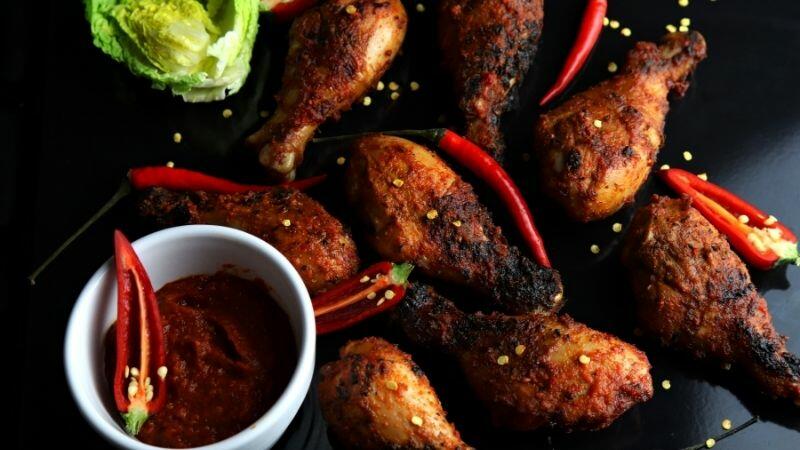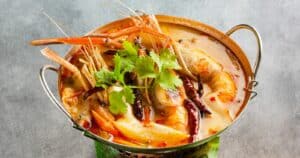You used to revel in the fiery thrill of spicy curries, hot sauces, and pepperoni pizza. But lately, those same spicy dishes just aren’t bringing the heat like they used to.
If you’ve noticed your tolerance for
The compounds that give hot peppers their kick are called capsaicinoids. They bind to special receptors in your mouth that sense heat and pain. If those receptors become less sensitive over time, spicy foods won’t activate them as much.
Reasons for this desensitization include:
- Built up tolerance from regular
spice exposure - Age-related deterioration of taste buds
- Use of old, stale spices
- Side effects of medications
Luckily, you can regain the thrill of scorching
- Take a break from spicy dishes to reset tolerance
- Use more fresh peppers like habaneros
- Add more cayenne or chili paste to recipes
- Drink less numbing alcohol during spicy meals
With some strategic heat-boosting tweaks, you’ll be sweating and panting in spicy bliss once more. Let’s reclaim that fiery magic!
It’s Not Your Imagination
First, rest assured it’s not just your imagination or taste buds playing tricks on you. There are some valid reasons behind your decreased ability to taste the
The compounds that give hot peppers their fiery flair are called capsaicinoids. They bind to special receptors in your mouth that sense heat and pain.
If those receptors become less sensitive over time, foods containing capsaicinoids won’t activate them as intensely, and your brain won’t read them as being as spicy.
Let’s look at why this
You’ve Built Up a Tolerance
This is one of the most common reasons spicy food loses its kick. If you eat a lot of fiery dishes, your taste buds build up a tolerance to capsaicinoids.
Over time, you become desensitized and need more
It’s similar to caffeine – if you drink it daily, you eventually need more to feel the stimulating effects because your body gets so used to it.
Your Taste Buds Have Changed
Natural aging causes your taste buds to slowly lose sensitivity. Like every other sensory organ, they degrade over time.
Factors like genetics, nutrition, and illnesses also influence how receptive your taste buds are to flavors as you get older. The more exposure you have to pungent spices, the more your taste buds will acclimate as well.
This dulling effect makes all flavors more difficult to detect, especially nuanced ones like
You’re Using Old Spices
Spices lose potency over time as their flavor compounds degrade. If your cayenne pepper or chili powder has been sitting unused in your pantry for a few years, it simply won’t have the same zing.
So while you might be adding what seems like enough
You Have Untreated Medical Issues
Certain medical conditions or medications can interfere with your ability to taste spicy flavors.
These include:
- Zinc deficiency
- Dry mouth
- Nerve damage
- Diabetes
- Antidepressants
- Blood pressure meds
- Antihistamines
Treating the underlying condition may help restore your
You’re a Supertaster
A small percentage of people have extra taste bud receptors that make them “supertasters.” They experience flavors like bitterness and
If you were once a supertaster, it’s possible this acuity has dulled with age, making formerly blistering hot foods seem tame by comparison.
How to Regain the Heat
If you miss the thrill of scorching
- Take a break from spicy dishes for a few weeks to reset your tolerance.
- Seek out hotter varieties of peppers like habaneros and ghost peppers.
- Use more cayenne, chili flakes, or chili paste than a recipe calls for.
- Add a spicy condiment like sriracha sauce on top of your food.
- Buy small quantities of spices more frequently for freshness.
- Suck on lemon wedges between bites to wake up your tastebuds.
- Avoid numbing alcoholic drinks during spicy meals.
With a little persistence, you can regain your
When to See a Doctor
While diminished spicy sensation is usually harmless, see a doctor if you:
- Have completely lost your sense of taste
- Feel pain or burning in your mouth constantly
This could indicate nerve damage, vitamin deficiency, or other medical issues requiring treatment beyond just lackluster paprika.
Don’t resign yourself to bland food forever. With some attention and added heat, you can get your palate burning happily again.
Top 10 Spicy Food Challenges in America
For thrill-seeking spiceheads unafraid of screaming tastebuds, try these daredevil challenges using the hottest peppers and sauces known to humanity:
- Carolina Reaper Challenge – PuckerButt Pepper Company – Fort Mill, SC
- Aldi Carolina Reaper Jerky Challenge – Aldi Grocery Stores – Nationwide
- Mad Dog 357 Silver Edition Hot Sauce Challenge – Ashburn, VA
- Hellfire Fear This Hot Sauce Challenge – Hellfire Hot Sauce Company – San Diego, CA
- Satan’s Toilet Carolina Reaper Challenge – Crazee Burger – Charlotte, NC
- Hot Chicken Challenge – Hattie B’s Hot Chicken – Nashville, TN
- Black Jaguar Hot Sauce Challenge – Black Jaguar Cafe – Chicago, IL
- 7th Level of Hell Challenge – Angry Dog Hot Sauce – Dallas, TX
- Hot Wing Challenge – Duff’s Famous Wings – Buffalo, NY
- Inferno Soup Challenge – Nitally’s ThaiMex Cuisine – St. Petersburg, FL
These tongue-torching challenges will blast even the most hardened
In Summary
For spicy food devotees struggling to taste the heat, don’t lose hope! Arm your dishes with fresh peppers and strategic tweaks until your palate once again feels the fiery thrill. With some patience and pepper power, you’ll be sweating and panting in spicy bliss in no time.
Sources
- The Spruce Eats: What Is Sichuan Peppercorn?
- Food Network: Chili Con Carne
- Britannica: Jambalaya
- NCBI: Physiology and Pharmacology of the Vanilloid Receptor
- Healthline: 5 Flaming Reasons for Craving Spicy Foods
- NCBI: Oral Sensory Nerve Damage: Causes and Consequences
- Trips to Discover: Top 15 UNESCO Culinary Traditions Around the World
- ResearchGate: Capsaicin: A Review of Its Pharmacology and Clinical Applications





